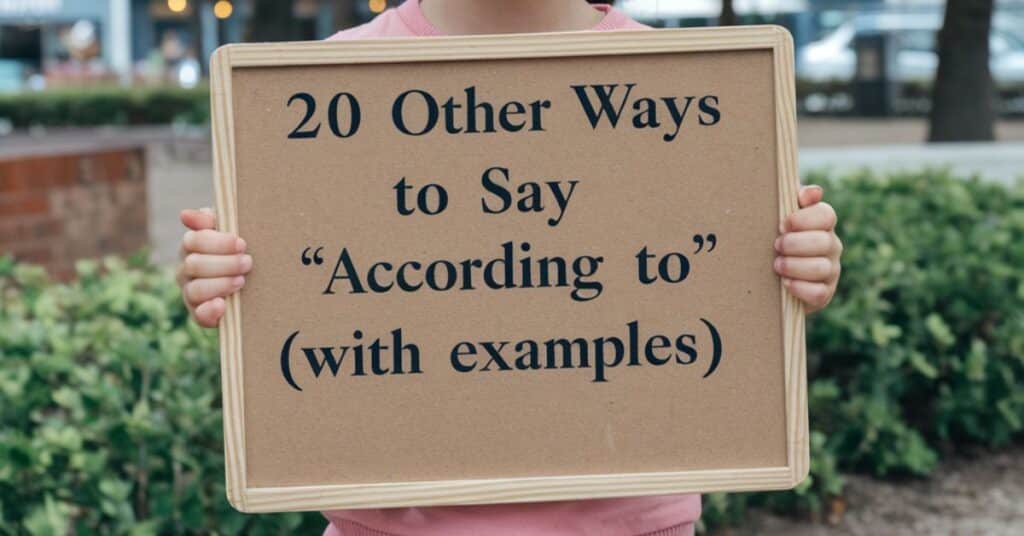When writing or speaking, the phrase “according to” can become repetitive. To improve your communication and keep your writing or speech engaging, it’s essential to have a variety of alternatives. Below are ten different ways to say “according to,” with examples, helping you diversify your language and ensure clarity.
1. As Per
“As per” is a more formal alternative used in professional and legal contexts to indicate adherence to rules or instructions.
Example:
“As per the instructions, all documents must be submitted by 5 p.m.”
2. In Line With
“In line with” signifies alignment with a rule, policy, or guideline.
Example:
“In line with company policy, all employees must wear their ID badges at all times.”
3. Based On
“Based on” is commonly used when referencing facts or data that form the basis for a conclusion.
Example:
“Based on recent studies, a balanced diet is key to maintaining good health.”
4. Following
A formal phrase used to indicate compliance with a regulation or standard.
Example:
“Following traffic laws, all drivers must wear seat belts.”
5. As Stated By
“As stated by” is useful when citing someone’s written or spoken words.
Example:
“As stated by the President, the economy is expected to grow steadily over the next year.”
6. As Reported By
Used when referencing a news outlet, research paper, or authoritative source.
Example:
“As reported by BBC News, the new policy has sparked widespread debate.”
7. In the Words Of
This phrase is ideal for quoting someone directly.
Example:
“In the words of Winston Churchill, ‘Success is not final; failure is not fatal: It is the courage to continue that counts.’”
8. On the Authority Of
Use this when relying on the expertise of a professional or respected source.
Example:
“On the authority of financial analysts, now is the right time to invest.”
9. As Mentioned By
A helpful phrase when pointing to something previously referenced by a person.
Example:
“As mentioned by the teacher, all assignments are due by Friday.”
10. From the Perspective Of
This alternative is used when conveying a specific viewpoint.
Example:
“From environmentalists’ perspective, the recent legislation is a step in the right direction.”
11. As Indicated By
This phrase is used when referencing a report or someone’s indication of a fact or opinion.
Example:
“As indicated by the survey results, customer satisfaction has improved significantly.”
12. Citing
Used when mentioning the source of information or quoting directly from a text.
Example:
“Citing the latest study, the professor argued that climate change is accelerating.”
13. As Suggested By
Useful when referring to someone’s recommendation or proposal.
Example:
“As suggested by the consultant, we should revise the marketing strategy.”
14. Referring To
This option works when directing attention to a specific source or previous statement.
Example:
“Referring to the manual, the device should be reset every month for optimal performance.”
15. As Seen In
Often used in media or advertising to point to where something has been published or shown.
Example:
“As seen in the magazine, this product is gaining popularity worldwide.”
ALSO READ THIS ARTICLE:10 Other Ways to Say “Great Job” (With Examples)
16. As Pointed Out By
This phrase emphasizes what someone has previously noted or highlighted.
Example:
“As pointed out by the chairman, the company must adapt to changing market conditions.”
17. As Expressed By
This alternative is ideal when referring to someone’s expressed thoughts or opinions.
Example:
“As expressed by the artist, the painting symbolizes hope and resilience.”
18. In Reference To
This phrase is commonly used to connect a statement with something that has already been mentioned.
Example:
“About last week’s meeting, we will be implementing the new procedures immediately.”
19. As Highlighted By
When you want to draw attention to something important, “as highlighted by” works well.
Example:
“As highlighted by the research, regular exercise contributes to overall well-being.”
20. As Affirmed By
A formal alternative, is often used when someone supports or agrees with a particular statement.
Example:
“As affirmed by legal experts, the new law protects citizens’ rights more effectively.”
Frequently Asked Questions
1. What is the meaning of ‘According To’?
“According to” is used to refer to what someone has said, or written, or to reference a source of information. It introduces statements that rely on authority, data, or opinion.
2. Why should I use alternatives to ‘According To’?
Using alternatives prevents repetitive language, enhances readability, and improves communication clarity by offering varied expressions.
3. Can these alternatives be used in formal writing?
Yes, phrases like “following,” “as per,” and “on the authority of” are well-suited for formal writing.
4. Are these phrases interchangeable with ‘According To’?
In most cases, yes. However, each alternative offers a slightly different nuance, so it’s essential to choose the one that best fits the context of your writing.
Conclusion
Expanding your vocabulary by using alternatives to “according to” improves the flow and professionalism of your writing or speech. These ten options help avoid repetition and add clarity and nuance to your communication. Whether writing for academic, professional, or casual purposes, using varied expressions like “in line with” or “based on” can keep your audience engaged.

“Robert Henry is an experienced blogger with a passion for language and education. His insightful posts on Vocab Scope offer readers valuable tips on vocabulary and grammar. With a background in linguistics and a knack for clear, engaging writing, Robert is dedicated to helping others enhance their communication skills.”






